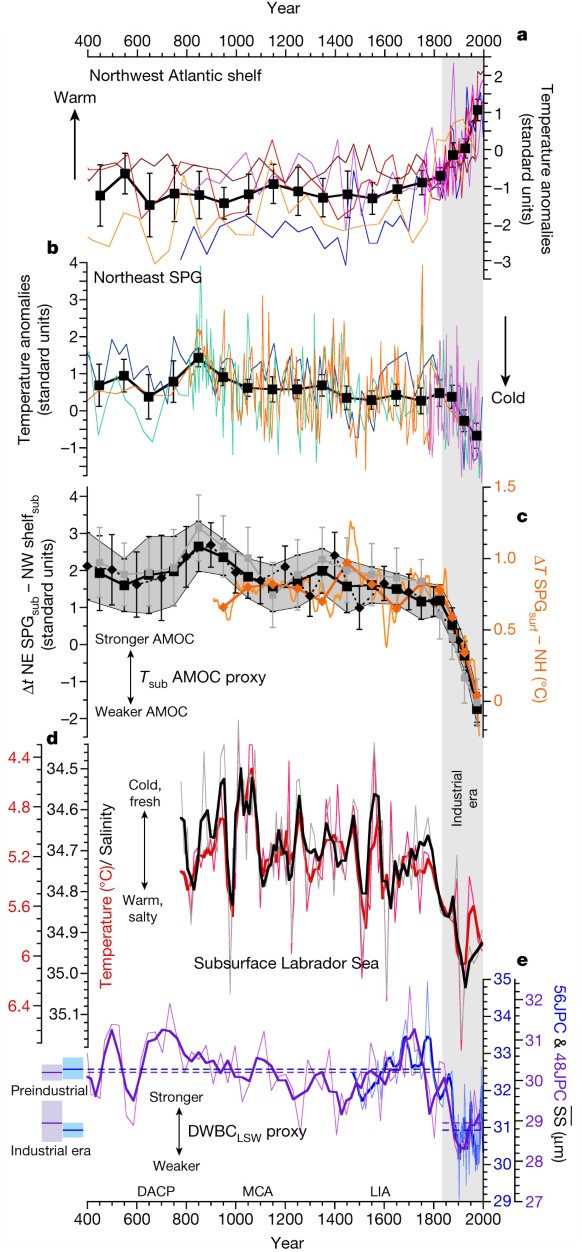- Joined
- Dec 22, 2012
- Messages
- 66,529
- Reaction score
- 22,174
- Location
- Portlandia
- Gender
- Male
- Political Leaning
- Libertarian - Right
I already have.
No you didn't. I mean from the two linked papers.
I already have.
Post #18 is your friend for the paper I quoted directlyNo you didn't. I mean from the two linked papers.
Post #18 is your friend for the paper I quoted directly
https://www.debatepolitics.com/envi...ng-gulf-stream-new-data-2.html#post1068395351
For the other article, right in the abstract:
This weakening is revealed by a characteristic spatial and seasonal sea-surface temperature ‘fingerprint’—consisting of a pattern of cooling in the subpolar Atlantic Ocean and warming in the Gulf Stream region—and is calibrated through an ensemble of model simulations from the CMIP5 project. We find this fingerprint both in a high-resolution climate model in response to increasing atmospheric carbon dioxide concentrations, and in the temperature trends observed since the late nineteenth century.
And again in the conclusion
Although long-term natural variations cannot be ruled out entirely29,30, the AMOC decline since the 1950s is very likely to be largely anthropogenic, given that it is a feature predicted by climate models in response to rising CO2 levels.
There are a few other references to anthropogenic warming in the paper.
I have no idea why I have to spoon-feed this to you, but... whatever.
:roll:I see...
Unproven correlations and models that are statistically wrong.
An abstract is really not very good to quote. Especially when a paper is not paywalled...
Post #18 is your friend for the paper I quoted directly
https://www.debatepolitics.com/envi...ng-gulf-stream-new-data-2.html#post1068395351
For the other article, right in the abstract:
This weakening is revealed by a characteristic spatial and seasonal sea-surface temperature ‘fingerprint’—consisting of a pattern of cooling in the subpolar Atlantic Ocean and warming in the Gulf Stream region—and is calibrated through an ensemble of model simulations from the CMIP5 project. We find this fingerprint both in a high-resolution climate model in response to increasing atmospheric carbon dioxide concentrations, and in the temperature trends observed since the late nineteenth century.
And again in the conclusion
Although long-term natural variations cannot be ruled out entirely29,30, the AMOC decline since the 1950s is very likely to be largely anthropogenic, given that it is a feature predicted by climate models in response to rising CO2 levels.
There are a few other references to anthropogenic warming in the paper.
I have no idea why I have to spoon-feed this to you, but... whatever.
Thornalley does not say the rate of the slowdown is accelerating.Thornalley is simply looking at a longer time frame (1600 years).
His position is that anthropogenic warming has perpetuated and accelerated the rate of slowdown in recent years.
Thornalley's data says it... which you would have known, if you had bothered to actually read the paper.Thornalley does not say the rate of the slowdown is accelerating.

Two papers have come out in Nature, showing how the Gulf Stream (AMOC) seems to be slowing as a response to AGW.
One of the authors and a noted authority Stefan Rahmsdorf has a post reviewing the state of the data on the AMOC at Real Climate.
Stronger evidence for a weaker Atlantic overturning circulation « RealClimate
The studies show that the AMOC is the weakest it’s been in at least 1000 years, and that it has weakened by 15% in the last decades of the 20th century. More weakening can lead to colder conditions in Europe and the Eastern US in the winter, and heat waves in Europe in the summer, in addition to higher sea level in the Eastern US.
This is fairly big news on the earth science front. It probably will set deniers all a-twitter too. You know how they get when data doesn’t say what they want it to say.
Studies:
Anomalously weak Labrador Sea convection and Atlantic overturning during the past 150 years | Nature
http://www.nature.com/articles/s415...KyeWhlTvQKe6JHGdYV8iLm4nND7KgW4aTVEUH8xo0AA==
Graphs are subjective!Thornalley's data says it... which you would have known, if you had bothered to actually read the paper.
The scary part is.. Someone was measuring the AMOC 1000 years ago?
djl
Ah.
A denier-in-training.
:roll:
In other words, you haven't actually read either paper, and have no substantial objections -- just a knee-jerk reaction because it doesn't fit your ideology. *yawn*
Plus, you demanded I quote specific paragraphs, and now you complain? That's some bull**** right there.
P.S. The link in the OP is to the full papers.
